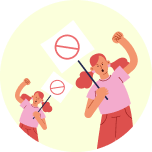What is Global Plagiarism with Examples - SmallSEOTools

What is Global Plagiarism with Examples?
Plagiarism, in any form, domain, or field, is always bad. It leads people to multiple consequences. However, in most cases, it's not career-threatening. However, there is a type of plagiarism that could ruin your reputation and your career.
In this article, we will talk about that type of plagiarism. And it's global plagiarism.
Let's get straight to the point!
What is Global Plagiarism?
Global plagiarism is a type of plagiarism in which the plagiarist copies the entire content of another author, outsources work, or copy-pastes a significant portion of a study, makes no changes to it, and claims the authority for the work.
It's the most severe form of plagiarism, as the plagiarist doesn't put effort into content creation. Instead, they just pick others' work and publish/submit it as it is without altering anything.
Generally, this type of plagiarism occurs in academic assignments, as students don't know much about it. Also, they think that they can achieve higher grades by using others' work. Apart from assignments, it can also occur in online content, business reports, ad copy, etc. It's a deliberate effort to deceive others. Therefore, neither educational institutes nor search engines bear this form of plagiarism.
Types of Global Plagiarism
There are three main types of global plagiarism. And here they are!
-
Complete Copy-Paste
This type of plagiarism occurs when someone copies and uses the entire work of another creator. The work could be anything, including text, images, audio, etc. However, this type of plagiarism occurs generally in academia.
For instance, many scholars and students don't want to write research-based articles and assignments. So, they just go online, explore different studies, pick a relevant study, and submit it to journals or tutors.
Remember, if you completely plagiarize another person's work and claim its authority, you may face severe consequences. You can even lose your job or get expelled from your academic institute. Therefore, never entirely copy-paste others' projects. However, if you have to do so, get permission from the original creator and give credit to them.
-
Buying or Outsourcing Work
It's also common in academic settings. Generally, students don't create assignments themselves. Instead, they hire professional academic writers from online platforms and ask them to create assignments for them. In most cases, they don't get caught, as experienced writers don't use malpractices to write assignments. However, this is itself malpractice. Therefore, you must avoid it.
The real issue is that it's a deceptive activity. It undermines both professional and personal integrity, as the person gets credit for work they didn't create. Those who get higher grades using this practice learn nothing during the entire process. So, they don't deserve to get professional degrees.
-
Self-Plagiarism
In some cases, self-plagiarism also falls into this particular category. Often, students and content creators submit their previous work as new without disclosure. They think that since they are the original creators of the work, it won't be considered plagiarized, so they don't think twice before submitting it.
Remember, no matter who created the content. If it's submitted elsewhere, you are not allowed to reuse it for any purpose without acknowledgement. It could mislead others. They might think that the content is fresh and original.
Consequences of Global Plagiarism
Let's discuss the potential consequences of global plagiarism!
-
Damage to Reputation
Almost all types of plagiarism are harmful to a person's reputation. Whether you have done it intentionally or unintentionally, instances of plagiarism in your content can ruin your reputation. Whether you are a scholar, student, content creator, or creative artist, global plagiarism can destroy your credibility, and people won't consider you creative. Remember, once a person gets the label of a plagiarist, they may not remove it easily.
-
Legal Repercussions
Global plagiarism can also lead to legal issues. No one wants others to get credit for their work. Therefore, they may sue the plagiarist in court if they find out that a person ha s used their work without accreditation. Copyright laws are well-defined across the globe. If a person is found guilty of using others' work for commercial purposes, the courts could ask them to pay compensation. In the worst case, they could also send the person to jail.
-
Loss of Professional Opportunities
Global plagiarism can also affect a person's career. The plagiarists may not get the professional opportunities they want. For instance, just because President Biden used another researcher's work in his law college assignment, he had to withdraw from the presidential race in 1988. He had to wait over thirty years to participate in the presidential elections.
Also, if you work somewhere and your employers realize that you plagiarize others' work, they could immediately act against you and terminate your contract. Similarly, it could also cost you lots of projects.
-
Academic Penalties
If you are a student, no matter what, always avoid global plagiarism. Academic institutes have strict policies regarding it. Once a student is caught engaging in this form of plagiarism, they may have to face severe consequences for that. If they are lucky, they may have to revise their assignments. Otherwise, they will get failing grades. However, in the worst case, they could get expelled from the institute.
Academic institutes highly value academic integrity and don't compromise on it at any cost. Global plagiarism undermines all the fundamental values of academic integrity. Therefore, they take strict action against all those involved.
Tips to Avoid Global Plagiarism
Avoiding global plagiarism is quite easy. Try these few techniques, and you can easily prevent them!
-
Cite Your Sources
If you want to use another person's work, you must mention the source and clearly indicate that the particular work doesn't belong to you. This practice is quite common in creative fields, especially music. Many music producers credit the original composers when they copy their work. Similarly, give them due credit if you want to use another creator's work. It's better to get permission from the creator before using their work.
(Note: You can utilize our citation generator to reference content sources copied from various references.)
-
Be Sincere with the Work
In most cases, global plagiarism is an intentional effort to deceive people. Sometimes, people don't have the required expertise to create an original piece of content. Also, they often lack time, so they search for shortcuts. And global plagiarism is one of those shortcuts.
No matter what, always be sincere with your work. Never be involved in any malpractice to finish the tasks. Instead, put in some extra effort to create content. It will help you prevent plagiarism and boost your skills as well.
-
Check Plagiarism
If you have created textual content, before submitting it somewhere, check it for plagiarism. When you use a trusted online plagiarism checker to check the text for originality, it profoundly scans the content. It compares it with the content published on billions of web pages and provides similarity reports. Checking the plagiarism report can help you learn whether your content is original and ready to publish. If it's original, submit/publish it wherever you want. Otherwise, make the required modifications to the content before submission.
-
Paraphrase, When Necessary
Generally, content creators think that paraphrasing is unethical. But it's not. It's essential to ensure originality. Sometimes, we must get relevant and helpful material from other sources, especially when creating research-based content. In such cases, we cannot always copy and paste the content as it is. That's where paraphrasing comes into play. By paraphrasing the text, we can easily bless the content with a fresh look and ensure uniqueness. So, use this technique when required.
Conclusion
Global plagiarism can ruin a person's credibility, reputation, and career. Therefore, content creators must prevent it at all costs. Thankfully, avoiding it isn't very tricky. Use a few simple strategies, and you will be able to prevent global plagiarism and ensure originality.











